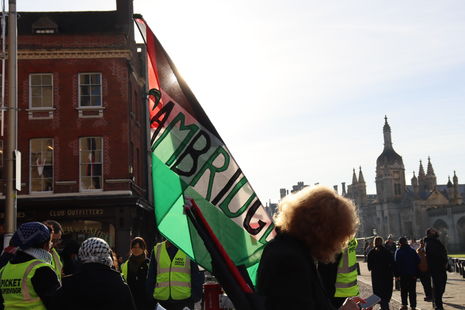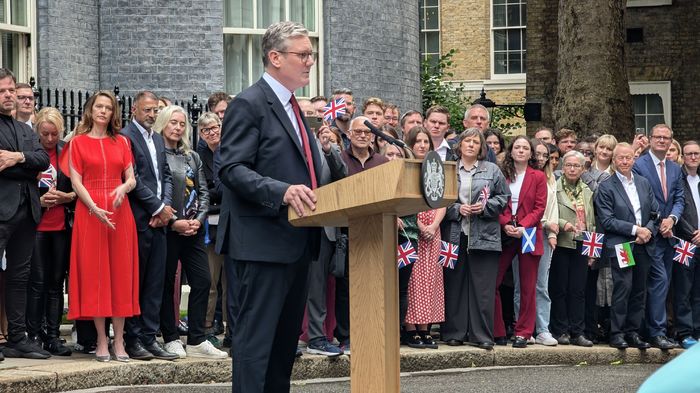The importance of student protests isn’t up for debate
Katie Nicholson argues that the right of students to protest is an essential facilitator of political expression

In response to countless world crises and institutional decisions, students have consistently taken a stand for what they believe is right. Universities have long served as spaces for political engagement. This is why the recent pushback against student protests and freedom of speech on campus is so troubling. Student protests allow students to assert themselves, representing causes they care about. They are expressions of political agency and democratic rights.
The recent announcement that King’s College is divesting from arms companies is a clear demonstration of the impact student activism can have. Politicisation on campus is natural and, up to a point, should be encouraged. Coming in the wake of measures to limit freedom of speech on campus, the decision from King’s shows exactly why such freedoms need to be protected. Moreover, the eviction of encampments at St John’s College and Trinity College in the past few days show the encroachment on this. Student protest can prompt change and should be seen as an effective means of political engagement, not a mere inconvenience.
“Political engagement must remain accessible and inclusive”
This clamp down on freedom of speech on campus isn’t just limited to Cambridge. Liberty Investigates and Sky News revealed that universities have been actively working to restrict protest on campus. Liberty’s involvement in a legal challenge against the University over what they have labelled an attempt to “silence students and academics” reveals just how immediate and local this debate has become.
A recent pro-Palestinian protest during graduation ceremonies at the Senate House raised further debate around the form protests can take. Whether they intend to or not, all students can be affected by activism on campus. Where to draw the line in regard to protesting is always going to be a debated issue – where disruption becomes dangerous, which protests are important or irrelevant. But remaining objective and consistent in evaluating protests is essential. The right to protest must be judged independently of the cause being advocated.
There are places on campus where political engagement is encouraged; political societies and the Cambridge Union are places where debate is fostered. Often, however, the topics discussed are dictated, and participation hinges on financial requirements. Whilst they do allow for political activity on campus, they can hardly be said to be a replacement for free speech; political engagement must remain accessible and inclusive.
“Student protest is an effective means of political engagement”
Student protest at Cambridge has been prevalent in both world and local issues for generations. The 2010 student protests, for example, saw an 11-day occupation of the Old Schools. But these protests haven’t always occurred without repercussions. The 1970 Garden House riots, opposing the proposal of a ‘Greek week’ given the Greek Junta, and resulting in £2276 of damage, led to the eight students being convicted, with six facing nine to eighteen months in prison. The line had to be drawn, and some students fell on the wrong side of it. Protests against university issues have seen fewer consequences, but their existence and importance, ranging from issues such as library opening times and food prices to protests in 1897 over women being allowed to receive full degrees, are still integral. Protest on campus has always existed, has been punished when needed, but has set a precedent – student protest is important as a way to address issues on many scales, from local issues to world events.
Protests, by nature, test boundaries. While it is important to debate where those boundaries lie – for safety, respect, and order – the right of students to protest itself should not be up for debate. Students’ political ambitions should be encouraged, and, to an extent, so should the protests that go alongside this. Students must be allowed to speak out, to challenge institutions, and to push for change.
 News / Colleges charge different rents for the same Castle Street accommodation2 March 2026
News / Colleges charge different rents for the same Castle Street accommodation2 March 2026 News / News in Brief: waterworks, wine woes, and workplace wins 1 March 2026
News / News in Brief: waterworks, wine woes, and workplace wins 1 March 2026 News / Climate activists protest for ‘ethical careers policy’1 March 2026
News / Climate activists protest for ‘ethical careers policy’1 March 2026 News / Angela Merkel among Cambridge honorary degree nominees27 February 2026
News / Angela Merkel among Cambridge honorary degree nominees27 February 2026 News / Private school teacher who lied about Cambridge degree barred from teaching27 February 2026
News / Private school teacher who lied about Cambridge degree barred from teaching27 February 2026









